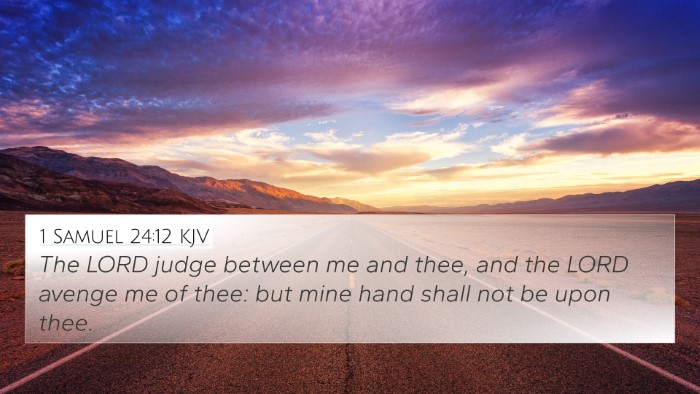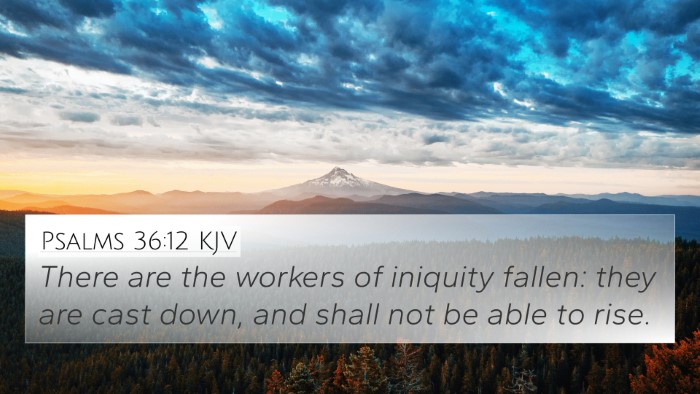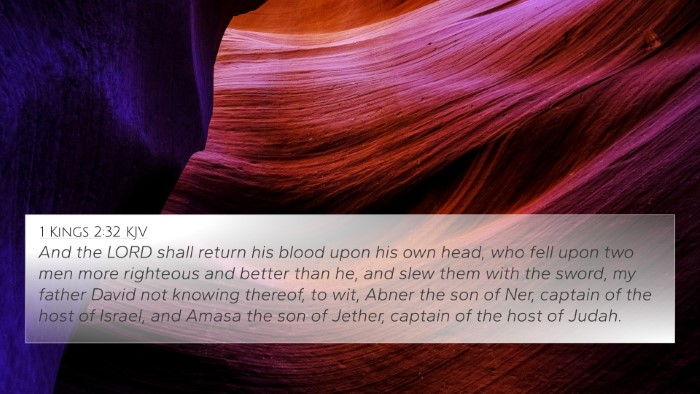Bible Verse Meaning of Psalms 7:16
Psalms 7:16: "His mischief shall return upon his own head, and his violent dealing shall come down upon his own pate."
This verse conveys a powerful message about justice and the consequences of wrongdoing. The psalmist describes how the evil actions of the wicked will ultimately backfire, leading to their own destruction. The imagery of "mischief" returning upon one's head emphasizes the theme of divine retribution that runs throughout the Scriptures.
Commentary Insights
Matthew Henry's Commentary
Matthew Henry highlights the principle of divine justice at work in this verse. He explains that those who plot evil will find themselves ensnared by their own schemes. He emphasizes that God is a righteous judge who ensures that every act of wickedness is accounted for and punishes the guilty, reflecting the overarching theme of God's sovereignty and moral order in creation.
Albert Barnes' Notes
Albert Barnes remarks on the certainty of retributive justice, observing that the wicked often bring about their own destruction through their actions. He notes that this principle is not limited to earthly experience; rather, it resonates with the beliefs present throughout biblical texts. Barnes connects this verse to the idea that the divine governance aligns with moral law, ensuring that wrongdoers cannot escape the repercussions of their misconduct.
Adam Clarke's Commentary
Adam Clarke expands on the metaphorical nature of the verse, describing the "violent dealing" as indicative of the violent tendencies often seen in the wicked. Clarke suggests that such traits lead to a self-induced downfall. He draws attention to how this verse serves as a sobering reminder for all individuals, urging a reflection on one's actions and their eventual consequences.
Cross-References and Thematic Connections
This verse can be understood through its connections with various other scriptures that illustrate similar themes of justice and retribution:
- Proverbs 26:27: "Whoso diggeth a pit shall fall therein: and he that rolleth a stone, it will return upon him." - This verse emphasizes that harmful intentions create a cycle of negativity that ultimately affects the perpetrator.
- Galatians 6:7: "Be not deceived; God is not mocked: for whatsoever a man soweth, that shall he also reap." - Reinforcing the principle that one's actions will lead to corresponding consequences.
- Job 4:8: "Even as I have seen, they that plow iniquity, and sow wickedness, reap the same." - Echoing the theme of reaping what one sows as a universal truth.
- Matthew 7:2: "For with what judgment ye judge, ye shall be judged: and with what measure ye mete, it shall be measured to you again." - Reflecting divine justice in human interactions.
- Romans 12:19: "Dearly beloved, avenge not yourselves, but rather give place unto wrath: for it is written, Vengeance is mine; I will repay, saith the Lord." - Highlighting God's role in administering justice.
- Psalm 9:16: "The Lord is known by the judgment which he executeth: the wicked is snared in the work of his own hands." - Reinforcing the idea of divine judgment against wrongdoers.
- 2 Thessalonians 1:6: "Seeing it is a righteous thing with God to recompense tribulation to them that trouble you." - Emphasizing God's promise to bring justice to His people.
Thematic Bible Verse Connections
The verse from Psalms resonates deeply within the broader biblical narrative concerning themes of justice, retribution, and moral order. It is part of a larger dialogue across the Scriptures that emphasizes accountability and the moral consequences of one's actions.
Identifying Connections Between Old and New Testament
By exploring connections across testamental themes, one can find a cohesive understanding of God's justice from Genesis through Revelation. For instance, the messages of accountability and divine retribution are prevalent in both the moral laws given to Israel and the teachings of Jesus during His ministry.
Conclusions on Psalms 7:16
In summary, Psalms 7:16 serves as a potent reminder of the principles of divine justice. The insights from various commentators illustrate the depth of meaning encoded in this verse, while the cross-references highlight its relevance to both personal conduct and broader societal norms. As believers explore these themes, they are encouraged to reflect on their actions and understand the inevitability of justice governed by a sovereign God.
Tools for Bible Cross-Referencing
For those looking to deepen their understanding of cross-referencing biblical texts, consider utilizing:
- Bible Concordance: Useful for finding specific verses and their occurrences.
- Bible Cross-Reference Guide: Can aid in systematically linking scripture passages.
- Bible Reference Resources: Various printed and online tools available for in-depth study.
Cross-referencing Bible study not only enhances comprehension but also enriches one’s spiritual journey, leading to a more profound grasp of biblical principles. Through diligent study, believers can glean wisdom and make connections that deepen their faith and understanding of scripture.













